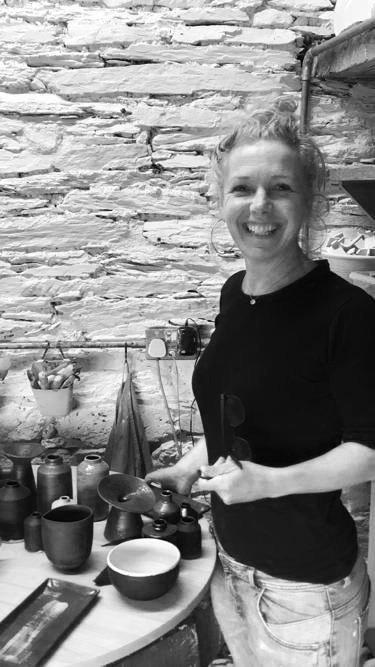Tutors
-

Lucy Bell
Lucy’s journey with clay started about 6 years ago and continues to evolve. Having worked as a support worker for more than 10 years with various client groups (drug and alcohol, learning disabilities, young women, domestic abuse, homelessness and mental health) she needed a calming outlet. That is where clay came into her life.
Lucy started attending some evening classes at a local pottery and was instantly hooked! When she works with clay, everything disappears. she is totally enchanted. Her work is a practice of loving, nurturing and creating something into being, then totally letting go of all expectations and attachments as that piece enters the kiln or fire and is transformed into something new and often unexpected.
For her ceramics is the perfect personification of mindfulness practice which fits with my background of delivering a mindfulness and nature connection programme over the past 4 years to local individuals in the community with mental health needs.
Lucy currently teaches pottery at Landworks in Dartington. This project works to provide a supported route back into employment and the community for people in prison or at risk of going to prison. She has noticed the therapeutic benefit that clay has on these individuals. The pottery provides a place of calm and a creative outlet for their emotions. The emotions of anger, self worth and frustration often arise. The quiet atmosphere of the pottery allows people to explore these emotions in a more embodied and safe place.
-

Julia Toy
Julia’s work is an extension of her love for life and spiritual connection to the natural world; It is informed by a variety of people, places and experiences.
Her process is intuitive and spontaneous and she finds the very nature of working with clay to be slow, soothing and grounding. She enjoys using both the wheel and hand building techniques.
She is continually experimenting with local foraged clay, different clay blends and glazes. She will frequently return home from swims, runs, and travels with pocketfuls of found objects, including rust, soil, ash, bones etc. These inclusions are often embedded into the clay, informing the beginnings of each piece.
The unpredictable and unique character of each piece continues with all these elements and their metamorphosis during the firing phase.
She hopes her work conveys her joy and enthusiasm for the ephemeral and imperfect nature of life itself.
Julia’s background is in sculpture, prop building and teaching, with a BA(hons) in fine art and a PGCE in Art & Design from Goldsmiths. I would be interested in teaching both adults and children.
She is an experienced teacher and has taught pottery in secondary schools and worked with vulnerable primary school pupils and teenagers in the care system. Julia is ‘thrived’ trained.
Having realised that clay with its flexibility, limitless possibilities and unpredictability is her chosen medium, she has begun a p/t MA in ceramics at Plymouth.
Julia works from her home studio in Totnes and teaches pottery at Coombe Farm Studios.
-

Alison Hannah
Alison is a teacher and ceramic artist practicing from her studio space in Totnes. Her work combines poetry, paintings and 3D ceramics and captures the interactions between people and landscape. The intention of her work is to celebrate the special qualities and distinctive characteristics of the South Devon and Cornwall shoreline, foreshores, estuaries, moors and woodland.
Alison creates works featuring watercolour sketches that capture the colour and content of the Devon coastline and Dartmoor. These scenes are transferred on to the artwork to fire onto the clay after the glaze firing. This produces pots that are unique and one-of-a-kind.
Alison has been teaching in the State Education system for over 25 years. She moved to Devon in 2015 to a senior role in order to establish a specialist Engineering college based in Torbay. A key development in the college was her work to develop partnerships with key employers such as the Royal Navy, Babcock, South West Water and the Environment Agency. Her insight into the challenges these organisations have to develop their future workforce features in the design of the ceramics programme. Resilience, creative problem-solving, cooperation, accuracy and precision are all key characteristics of the potter. Attributes that are developed through the work with clay and therefore make for a more interesting and employable individuals.
